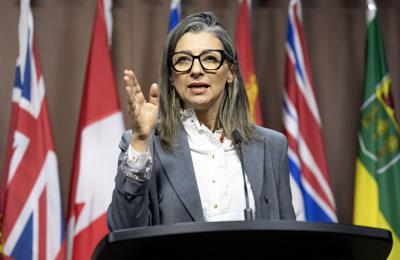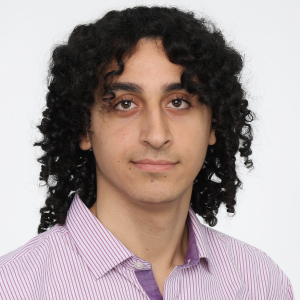Francesca Albanese was visiting Canada to urge the Trudeau government to increase pressure on Israel to end its war in Gaza.
“What are they fearing?”
Nov. 5, 2024

Francesca Albanese, the United Nations special rapporteur on the situation of human rights in the Palestinian territories occupied since 1967, speaks with reporters during a news conference in Ottawa on Nov. 5, 2024.

Francesca Albanese, the United Nations special rapporteur on the situation of human rights in the Palestinian territories occupied since 1967, speaks with reporters during a news conference in Ottawa on Nov. 5, 2024.
Adrian Wyld/The Canadian Press
By Mark Ramzy
By Mark Ramzy
Ottawa Bureau
OTTAWA—A United Nations rapporteur visiting Canada to urge the Trudeau government to increase pressure on Israel to end its war in Gaza, said she was “snubbed” by the Prime Minister’s Office and Foreign Affairs Minister Mélanie Joly.
Francesca Albanese, the UN’s special rapporteur on the occupied Palestinian territories, told the Star in Ottawa on Tuesday that an invitation to meet with officials at Global Affairs Canada was abruptly withdrawn a week before she arrived to Ottawa, while a scheduled appearance before the House of Commons’ foreign affairs committee, which is currently conducting an independent study on the fastest way for Canada to recognize a Palestinian state, was also cancelled. She described herself as having been “snubbed” by the Canadian government.
“It is not lost on me that despite the urgency of the current moment, with a few important exceptions, the political leadership in this country chose to either not meet me or withdraw invitations to meet me,” the human rights lawyer told reporters during a news conference.
“What are they fearing?”
Joly did not reply when asked in person by the Star about Albanese’s comments Tuesday.
Global Affairs Canada and the Prime Minister’s Office did not respond to requests for comment on Tuesday afternoon.
A clerk for the foreign affairs committee said its members agreed on Oct. 24 to withdraw their invitation to Albanese and requested a written statement instead, but did not explain why because the motion was adopted in a closed-door meeting.
Describing Israel’s military campaign against Hamas in Gaza as a “genocide” while also condemning the Oct. 7 Hamas attacks, Albanese said Canadian policy towards Israel is not “coherent” with its stated support for international human rights, and accused Canada and other Western nations of “colonial amnesia.”
That charge of genocide is the subject of a case brought forward by South Africa against Israel at the International Court of Justice. South Africa has argued Israel’s bombardment of densely populated areas and its failure to allow enough humanitarian aid were committed with “intent” to destroy Palestinians, while Israel declared the case “blood libel” and argued it’s doing its best to minimize civilian casualties and provide aid as it fights Hamas. An interim ruling in January said that Israel must end its military offensive in Gaza to prevent genocide.
Joly said at the time that Canada’s support for the ICJ “does not mean we accept the premise of the case brought by South Africa.”
“Under the UN’s 1948 Genocide Convention, the crime of genocide requires the intention to destroy or partly destroy a group because of their nationality, ethnicity, race or religion,” Joly said. “Meeting this high threshold requires compelling evidence.”
Since the Oct. 7 attacks, the Canadian government has said it supports Israel’s right to defend itself while urging restraint. Canada called for a ceasefire in December 2023 and moved to crack down on arms transfers to Israel that could end up being used in Gaza earlier this year.
Albanese said Canada should go further as she criticized the Trudeau government’s rejection of the genocide accusations and called for the immediate recognition of a Palestinian state, the cancelation of all arms exports to Israel, including transfers through third-countries, and a review of its trade agreement with Israel.
“It is clear to me that the Canadian people want more clarity, integrity and concrete action from their government on the atrocities we all see unfolding in Palestine, in Gaza,” she told reporters.
Albanese’s visit to Canada was met with opposition from pro-Israel groups, which have accused her of being divisive and making antisemitic remarks, citing her comparison of Israeli policies towards Palestinians to Nazi Germany’s treatment of Jews as one example, which the Canadian mission to the UN described as “unacceptable.”
The Centre for Israel and Jewish Affairs had called on government officials to refrain from meeting with Albanese while she is in Canada.
Shimon Koffler Fogel, the group’s president, told the Star in a statement Tuesday that “though we were not made aware of cancelled meetings, we are glad that our concerns were taken seriously, and that Albanese is not being given access to Canadian political leaders.”
Israel’s ambassador to Canada, Iddo Moed, said “the refusal of any Canadian government official to meet with her speaks for itself.”
Albanese said Tuesday that she is not criticizing Jews or Israelis, but the policies of the Israeli government.
“I have condemned the degree of the crimes against Israeli civilians, the killing, brutalization and the taking of hostages with the same rigour and with the same firm spirit I have condemned the crimes that Israel has committed against the Palestinian people before, on and after Oct. 7,” she said.
Correction — Nov. 6, 2024
This article has been updated. Francesca Albanese, the UN’s special rapporteur on the occupied Palestinian territories, is not a UN official as previously stated incorrectly. She is an independent expert appointed by the United Nations Human Rights Council.

Mark Ramzy is a federal politics reporter in the Toronto Star's Parliament Hill Bureau. Reach him via email: mramzy@thestar.ca
OTTAWA—A United Nations rapporteur visiting Canada to urge the Trudeau government to increase pressure on Israel to end its war in Gaza, said she was “snubbed” by the Prime Minister’s Office and Foreign Affairs Minister Mélanie Joly.
Francesca Albanese, the UN’s special rapporteur on the occupied Palestinian territories, told the Star in Ottawa on Tuesday that an invitation to meet with officials at Global Affairs Canada was abruptly withdrawn a week before she arrived to Ottawa, while a scheduled appearance before the House of Commons’ foreign affairs committee, which is currently conducting an independent study on the fastest way for Canada to recognize a Palestinian state, was also cancelled. She described herself as having been “snubbed” by the Canadian government.
“It is not lost on me that despite the urgency of the current moment, with a few important exceptions, the political leadership in this country chose to either not meet me or withdraw invitations to meet me,” the human rights lawyer told reporters during a news conference.
“What are they fearing?”
Joly did not reply when asked in person by the Star about Albanese’s comments Tuesday.
Global Affairs Canada and the Prime Minister’s Office did not respond to requests for comment on Tuesday afternoon.
A clerk for the foreign affairs committee said its members agreed on Oct. 24 to withdraw their invitation to Albanese and requested a written statement instead, but did not explain why because the motion was adopted in a closed-door meeting.
Describing Israel’s military campaign against Hamas in Gaza as a “genocide” while also condemning the Oct. 7 Hamas attacks, Albanese said Canadian policy towards Israel is not “coherent” with its stated support for international human rights, and accused Canada and other Western nations of “colonial amnesia.”
That charge of genocide is the subject of a case brought forward by South Africa against Israel at the International Court of Justice. South Africa has argued Israel’s bombardment of densely populated areas and its failure to allow enough humanitarian aid were committed with “intent” to destroy Palestinians, while Israel declared the case “blood libel” and argued it’s doing its best to minimize civilian casualties and provide aid as it fights Hamas. An interim ruling in January said that Israel must end its military offensive in Gaza to prevent genocide.
Joly said at the time that Canada’s support for the ICJ “does not mean we accept the premise of the case brought by South Africa.”
“Under the UN’s 1948 Genocide Convention, the crime of genocide requires the intention to destroy or partly destroy a group because of their nationality, ethnicity, race or religion,” Joly said. “Meeting this high threshold requires compelling evidence.”
Since the Oct. 7 attacks, the Canadian government has said it supports Israel’s right to defend itself while urging restraint. Canada called for a ceasefire in December 2023 and moved to crack down on arms transfers to Israel that could end up being used in Gaza earlier this year.
Albanese said Canada should go further as she criticized the Trudeau government’s rejection of the genocide accusations and called for the immediate recognition of a Palestinian state, the cancelation of all arms exports to Israel, including transfers through third-countries, and a review of its trade agreement with Israel.
“It is clear to me that the Canadian people want more clarity, integrity and concrete action from their government on the atrocities we all see unfolding in Palestine, in Gaza,” she told reporters.
Albanese’s visit to Canada was met with opposition from pro-Israel groups, which have accused her of being divisive and making antisemitic remarks, citing her comparison of Israeli policies towards Palestinians to Nazi Germany’s treatment of Jews as one example, which the Canadian mission to the UN described as “unacceptable.”
The Centre for Israel and Jewish Affairs had called on government officials to refrain from meeting with Albanese while she is in Canada.
Shimon Koffler Fogel, the group’s president, told the Star in a statement Tuesday that “though we were not made aware of cancelled meetings, we are glad that our concerns were taken seriously, and that Albanese is not being given access to Canadian political leaders.”
Israel’s ambassador to Canada, Iddo Moed, said “the refusal of any Canadian government official to meet with her speaks for itself.”
Albanese said Tuesday that she is not criticizing Jews or Israelis, but the policies of the Israeli government.
“I have condemned the degree of the crimes against Israeli civilians, the killing, brutalization and the taking of hostages with the same rigour and with the same firm spirit I have condemned the crimes that Israel has committed against the Palestinian people before, on and after Oct. 7,” she said.
Correction — Nov. 6, 2024
This article has been updated. Francesca Albanese, the UN’s special rapporteur on the occupied Palestinian territories, is not a UN official as previously stated incorrectly. She is an independent expert appointed by the United Nations Human Rights Council.
Mark Ramzy is a federal politics reporter in the Toronto Star's Parliament Hill Bureau. Reach him via email: mramzy@thestar.ca
No comments:
Post a Comment